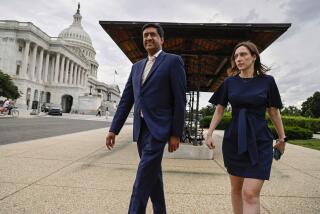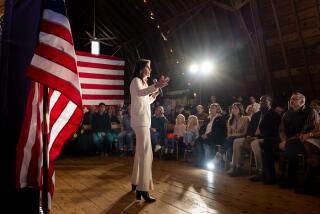Harkin Joins Democratic Contest for the Presidency : Politics: Iowa senator touts populist ‘new vision of America.’ He attacks Bush’s economic, foreign policy.
- Share via
WINTERSET, Iowa — Democratic Sen. Tom Harkin of Iowa declared his candidacy for his party’s presidential nomination Sunday, promising a whooping, hollering crowd of Middle-American supporters that he will “reclaim the American dream for all our people.”
Harkin, whose impassioned populist stump speeches have been lifting the flagging spirits of liberal Democrats around the country, sought to identify himself and his party with a “new vision of America” based on “fundamental and enduring values.” These turned out to be strikingly similar to many of the ideas that have helped make the White House a Republican preserve for most of the past 20 years.
Recalling his boyhood in the nearby town of Cumming, population 151, “a town where we used to leave the milk money on the porch . . . at night and we knew it would be there in the morning,” Harkin ticked off the guideposts that he said had shaped his life.
He spoke of “hard work, being frugal, . . . individual responsibility, taking care of your family, faith in God, love of country and care and concern for those less fortunate than ourselves.”
“Those are my values, those are your values, those are the values of hard-working Americans all across this land,” he said.
The setting Harkin chose--the 14th annual steak fry he has held on a friend’s farm near this community that boasts of being the birthplace of movie star John Wayne--could hardly have been better selected to drive home his claim on heartland traditions.
Under a blazing late summer sun, his audience sat on bales of hay or on benches under elm and oak trees, often rising to their feet to cheer Harkin’s call to battle against the villains of his piece: “George Herbert Walker Bush and J. Danforth Quayle.”
Some 3,000 people paid $15 apiece for picnic lunches of grilled steak, baked potatoes and iced tea, and many shelled out an additional $15 for souvenir T-shirts that evoked the memory of President Harry S. Truman’s 1948 campaign with the slogan: “Give ‘em Hell Harkin.”
Harkin tried his best to do just that. Speaking without a coat and tie, one hand gripping the lectern while the other pumped the air, with a grin often brightening his weathered countenance, the 51-year-old senator contrasted his vision of America with the message that he claimed emanated from the Republican White House.
“For the last four years, we’ve had a vision of an America where you are supposed to get what you can get in the shortest amount of time; don’t ask how you get it, just get it and to hell with everybody else.”
Harkin decried that as “a message of greed that pits race against race, creed against creed, sex against sex, old against young, class against class.”
Harkin, proclaimed the supply-side economic theory, adopted by former President Ronald Reagan and more or less pursued by President Bush, to be a disastrous failure and urged that “it be discarded on the trash heap of history with that other failed economic experiment called communism.”
One of the most outspoken critics of Bush’s policies during the Persian Gulf crisis, Harkin also condemned the President for believing that “the threats to our national security are halfway around the world when they’re really halfway down our streets.”
Otherwise, conspicuously missing from Harkin’s new vision was any reference to America’s role in the world, except for a proposal to reduce the millions of dollars the United States has been spending to help Western Europe defend itself against the Soviet Union.
Such an apparent disinterest in foreign policy has not seemed to harm Harkin significantly in this dovish state. But some Democrats believe this view, along with his opposition to the Gulf War, could hurt Harkin as a presidential candidate and could also harm his party should he become its nominee in 1992.
Harkin is the third nationally prominent Democrat to officially announce his presidential candidacy, following former Massachusetts Sen. Paul E. Tsongas and Virginia Gov. L. Douglas Wilder. In addition, Arkansas Gov. Bill Clinton, Nebraska Sen. Bob Kerrey and former California Gov. Edmund G. Brown Jr. are expected to enter the contest.
Harkin brings to the presidential race the same aggressive style and devotion to liberal activism that have shaped his career on Capitol Hill.
Winning election to the House in the post-Watergate year of 1974, he soon established himself as a forceful advocate of the economic interests of Iowa farmers and the cause of human rights, advocating that U.S. aid to regimes accused of totalitarian tendencies be conditioned on their progress in human rights.
After winning his first term in the Senate in 1984, he followed the same pattern, introducing a sweeping new approach to agriculture-support programs based on strict federal controls of production and marketing. That idea never got off the ground.
But Harkin could lay claim to an impressive achievement as chief sponsor of the 1989 Americans with Disabilities Act, which protects disabled citizens against discrimination.
He won reelection to the Senate last November by a comfortable margin over a formidable Republican opponent. The victory emboldened him last spring to begin testing support for a presidential candidacy. In the process, he has gained the grudging respect of even his ideological foes.
“He is becoming the voice of the party faithful and will be a very serious candidate,” said Al From, president of the Democratic Leadership Council, a group of elected officials seeking to move the party away from its liberal past. “But I don’t think that in a national campaign he can get the votes to win the presidency.”
But Harkin said in a recent interview that he understands the need to reach out to a broader electorate than his cadre of liberal supporters. “I want to make sure that I’ve got a base out there that is solid, that is ready to go the distance with me,” he said. “Then I’m going to say: ‘Let’s go out there and get a few more percent.’ ”
Ideology aside, to gain the nomination, Harkin will need to establish a geographic base in his home region of the Midwest, where he will face sharp competition, particularly from the anticipated candidacy of Nebraska’s Kerrey.
Harkin’s initial challenge will come in his home state, where Feb. 10 precinct caucuses kick off the national nominating process and where his chief adversary will not be any other candidate but the high expectations that will be set for him as a native son.
Tim Raftis, Harkin’s newly appointed campaign manager, said his candidate will need to exceed the performance of former Vice President Walter F. Mondale, from neighboring Minnesota, who captured 49% of the vote in the 1984 caucuses, while former Colorado Sen. Gary Hart finished second with 15%. But Harkin himself last week told Iowa reporters that he will have to do better than anyone has ever done. That means exceeding the 59% that then President Jimmy Carter gained in his 1980 reelection bid.
More to Read
Get the L.A. Times Politics newsletter
Deeply reported insights into legislation, politics and policy from Sacramento, Washington and beyond. In your inbox twice per week.
You may occasionally receive promotional content from the Los Angeles Times.







